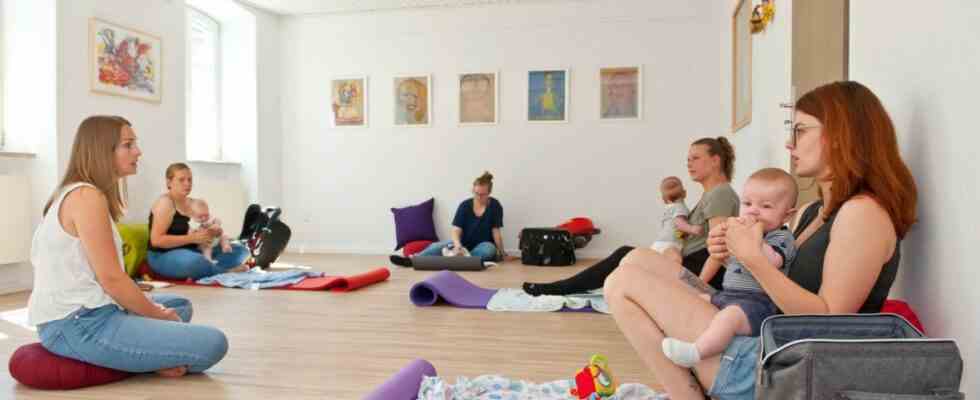The first weekend of September, when the rain washed away one or the other weekend plans, brought with it a first taste of an almost forgotten winter chill. In a few weeks, the cold of the unheated floor tiles will no longer lead to refreshing cooling, but rather to colds that runny nose. With its energy saving plan on August 24, the federal government announced that the winter cold will only be locked out to a limited extent this year and will instead creep through one or the other office corridor. But not only companies, but also social institutions are likely to have to struggle with the new measures from the beginning of autumn.
Susanne Knott, CEO of the family center in Poing.
(Photo: Christian Endt)
As CEO of the family center in Poing, Susanne Knott is looking forward to the forthcoming price increase with great uncertainty. As a tenant of the premises, which she uses in Poing for the offers of the family center such as childcare “mini club” or a wide range of courses, she can only influence the reduction of the additional costs to a limited extent. In most rooms, light and heating are controlled by motion sensors, which would have to be reprogrammed to adapt to the energy-saving measures. At the moment, Susanne Knott cannot estimate the increase in costs that the association, which is run on a voluntary basis, has to cope with. It is all the more difficult for the family center to react to the energy saving plans with effective measures.
Many institutions have been working on energy-saving programs for a long time
Hubert Schulze, the chairman of the Catholic Kreisbildungswerk in Ebersberg sees an effective measure above all in the use of renewable energies. As part of the environmental debate, the premises of the district education center have already been equipped to save energy, for example with LED lamps. “It is important to find a way with which we can cover the short-term increase in costs in the long term.”
Hubert Schulze, chairman of the Catholic district education center in Ebersberg.
(Photo: Peter Hinz-Rosin)
But with just one wind turbine in the district, the upcoming energy bottleneck is not surprising for the adult education center (VHS) in Vaterstetten. For this reason, Managing Director Helmut Ertel relies on energy-saving equipment in the premises. Even if the pending installation of LEDs will be a large investment in the short term, it will quickly pay off financially in the long term given the rising ancillary costs. In addition, the adult education center in Vaterstetten had its premises fitted with timers before the summer break, which can automatically reduce the lighting to the bare essentials via motion sensors. Because in addition to the energy shortage, the undisciplined behavior of visitors and employees, who like to leave the light in the bathroom or the heating on in unused rooms, contributes to the increased billing of ancillary costs for the VHS.
Helmut Ertel, director of the adult education center in Vaterstetten.
(Photo: Peter Hinz-Rosin)
Passing on the costs to the participants and visitors is not an option for any of the institutions. That would go completely against the purpose of the non-profit companies, says Susanne Knott, because they are just as affected by the energy crisis as the facilities themselves. Helmut Ertel also has concerns that some of the courses offered by visitors could be forgone for financial and physical reasons . Working at a room temperature of 19 degrees is still okay, “but at 19 degrees, visitors don’t want to lie down on a yoga mat”. Based on the same considerations, Hubert Schulze hopes that his visitors will definitely put up with the cold with the shorter program offerings.
A financial rescue package is required, as during the pandemic
Both the family center in Poing and the adult education center in Vaterstetten would like support from the state and the district during the next upcoming crisis if necessary. Especially in winter, in the dark season, when people are much more likely to seek refuge from being alone in social facilities anyway, Susanne Knott does not want to accept repeated restrictions on social services. For the VHS in Vaterstetten, as Ertel emphasizes, efficient, unbureaucratic financial aid for the facility is desirable, but only in accordance with current needs. Financial relief by means of tax measures, on the other hand, would relieve the institutions much too late. Instead of “pouring something into the world with a watering can”, Helmut Ertel would be able to benefit from individual coverage of the additional costs, as was the case with the rescue package during the pandemic. But even if one were to make use of financial aid from the government, this would hardly be a sustainable solution.

